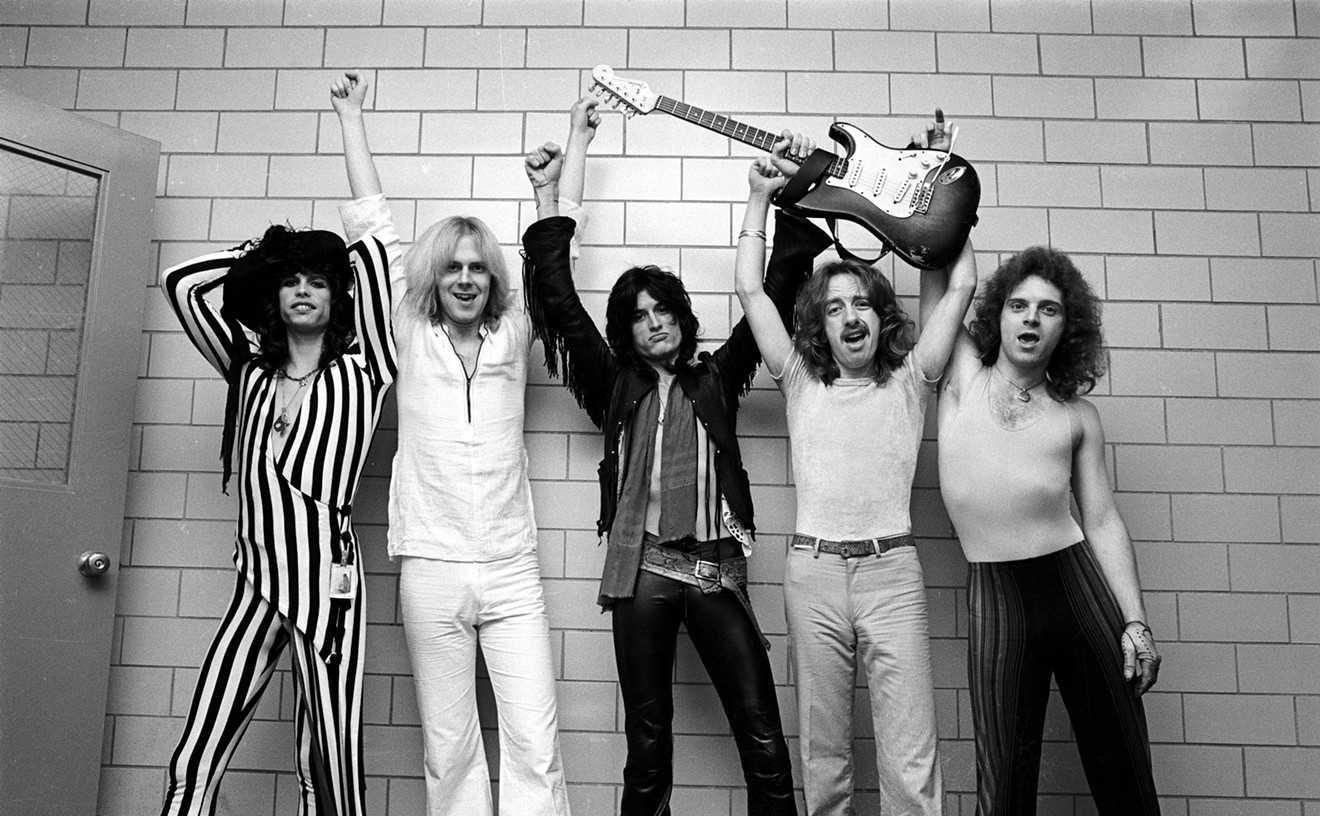Sure, indie bands will play the Valley two or three times, flogging the same disc because they desperately need the money. But Kings of Leon play on a completely different level.
Sure, if their recent performance at Bonnaroo is any indication, the Followill clan has a few new songs (Spin's blog review of the set referred to the new tracks as having "a rootsier, possibly even more ambitious aesthetic") and a Pixies cover up their sleeve, but if you coughed up $40 to see the band at Mesa Amphitheater last year, now you have another opportunity to hand over some more cash to these Tennessee pretty boys for mostly the same show. Kings of Leon have hit that point, and they might just be the biggest American rock band out there.
Not that there's anything wrong with giving fans what they want. The band is headlining a few festivals this summer in this country and in the United Kingdom, so why not throw some dates in before finishing up a new album? Even if Kings of Leon put on the exact same show as they did last May, new material isn't why most people go see arena acts. And when the band starts "Use Somebody," the crowd will go nuts. (You probably have that "someooonnne liiiiiikkkke yooooooou" bit going through your head right now. Sorry.)
Unless you're reading Rolling Stone or Spin — or basically any British publication — you'll find an intense hatred that music writers reserve for Kings of Leon. And it's disconcerting for music critics that Kings of Leon are our country's representative in the rock universe.
Hit pieces are generally easier to write than love letters, so at the taste-making website Pitchfork, a forthcoming Kings of Leon release date must resemble a holiday. Only By the Night was eviscerated as having lyrics resembling Meat Loaf's and peaking "after seven minutes." Because of the Times is more likely to be played in Pitchfork's office, but even that record has been described as a Southern knockoff of U2, working in themes of narcissism and out-of-control egos. Stephen M. Deusner gets off a particularly snappy line in his 2004 review of Aha Shake Heartbreak, calling Caleb Followill "a terrible singer, like a drunken Randy Newman with Tourette's," but with worse lyrics.
It's not just Pitchfork. It's almost as if the band was designed to irritate music elitists. Rumor has it that Kings of Leon were assembled by their label and producer Angelo Petraglia because of their good looks and their Southern take on garage rock.
The official story is slightly more complimentary, with two of the brothers deciding to write country songs in order to buy higher-quality weed, meeting up with Petraglia as a songwriting partner, then enlisting Caleb and Jared, who weren't musicians. Either way, Petraglia (who is credited with giving the Kings a crash course in the Southern rock the kids missed during their Pentecostal childhood) is generally seen as having a prominent role in creating the band's sound. That the band's early shows were more about attitude and style than ability did little to stop the accusations of svengalism.
Authenticity is a weird thing, especially in the era of blogism. Music seemingly created in labs by producers such as Max Martin, Dr. Luke, and Stargate, and performed by flavor-of-the-week pop stars, often will be ecstatically received by critics — the confusingly deceptive history of Andrew W.K. is a mysterious curio — but the idea that King of Leon's origin story has more in common with O-Town's than Lynyrd Skynyrd's is the sort of thing that sends critics into fits of rage.
The initial burst of praise from British critics didn't help. It didn't take long for the Kings to appear on the NME as the next big thing and to play to festival crowds. Every rock writer has a band he feels is unjustly obscure — and seeing a group seemingly better matched to fashion spreads than performing live can be infuriating. And the Followills' family bickering, bursts of utter stupidity in interviews, and general diva-ish behavior certainly didn't help.
Most people who actually buy music and pay for concert tickets are indifferent about where a band came from. It's just not important, and I've been as guilty as anyone in mistaking what's appealing about the band's music.
You know, it's probably just a couple of guys at RCA, along with Angelo Petraglia, who are calling the artistic shots for the Followills, adapting their sound from their early garage rock take on Molly Hatchet to a calculated turn toward the alternative-ish spin on the arena rock that U2 left behind when that band went adult contemporary. But whoever is pushing the buttons and writing the songs has done a stellar job. Whatever the hell it is that Caleb is singing on "Sex on Fire," it sounds like he really means it. The world — however imaginary — that the masterminds behind this whole thing have created fills a void for the type of person who still takes alternative rock radio seriously, and there are more people like that than there are Firefox bookmarks of Pitchfork.










